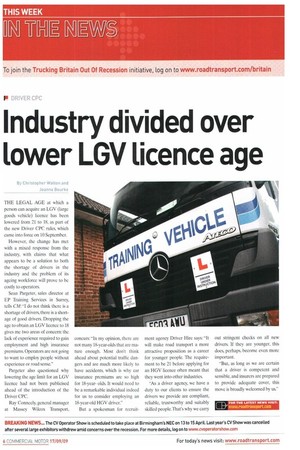Industry divided over Lower LGV licence age
Page 6

If you've noticed an error in this article please click here to report it so we can fix it.
By Christopher Walton and Joanna Bourke THE LEGAL AGE at which a person can acquire an LGV (large goods vehicle) licence has been lowered from 21 to 18, as part of the new Driver CPC rules, which came into force on 10 September.
However, the change has met with a mixed response from the industry, with claims that what appears to be a solution to both the shortage of drivers in the industry and the problem of its ageing workforce will prove to be costly to operators.
Sean Pargeter, sales director at EP Training Services in Surrey, tells CM: "I do not think there is a shortage of drivers, there is a shortage of good drivers. Dropping the age to obtain an LGV licence to 18 gives me two areas of concern: the lack of experience required to gain employment and high insurance premiums Operators are not going to want to employ people without experience or road sense."
Pargeter also questioned why lowering the age limit for an LGV licence had not been publicised ahead of the introduction of the Driver CPC.
Ray Conneely, general manager at Massey Wilcox Transport,
concurs: -In my opinion, there are not many 18-year-olds that are mature enough. Most don't think ahead about potential traffic dangers and are much more likely to have accidents, which is why car insurance premiums are so high for 18-yearolds. It would need to be a remarkable individual indeed for us to consider employing an 18-year-old HGV driver."
But a spokesman for recruit
ment agency Driver Hire says: "It will make road transport a more attractive proposition as a career for younger people. The requirement to be 21 before applying for an HGV licence often meant that they went into other industries.
As a driver agency, we have a duty to our clients to ensure the drivers we provide are compliant, reliable, trustworthy and suitably skilled people. That's why we carry out stringent checks on all new drivers. If they are younger, this does, perhaps, become even more important.
"But, as long as we are certain that a driver is competent and sensible, and insurers are prepared to provide adequate cover, this move is broadly welcomed by us."








































































































































